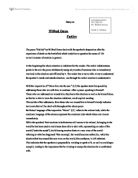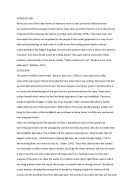Continuing he provides some more implicit information: “France” compared with “home” seems to be a foreign country, while the statement that the companion always woke, “even in France” furthermore indicates that this seems to be unusual there, that death seems to be present.
This helps to reveal the situation: the speaker seems to be a soldier in France who's companion has just been killed in war. A situation which he is not willing or not even able to accept, so that he tries to escape it by self delusion and forgetting the outside world by speaking to himself.
He almost desperately tries to cling to anything that indicates life and even tries to ask higher forces for help, by calling upon the “sun” (I,1), believing in its power to restore life.
After the immediate beginning by addressing his surroundings to "Move him" (I,1), he has to pause "-" (I,1) as if to wait if his utterance does have any affect and to give the "sun" a chance to interfere.
During this process of waiting, he starts to talk to himself, allowing his thoughts to take him away from the present situation, which he seems unable to cope with, reflected by his recall of the past, thinking of the "sun" that "always [...] woke" (I,4)his companion.
This turning away from the present seems to be a try to escape the situation he is unable to cope with by dreaming away to a happier and -even more important- peaceful past (I, 2-5):
he seems to be reflecting his companion's life from birth ("Gently its touch awoke him once", I,2) over adolescence ("At home, whispering of fields unsown. / Always it woke him " I,3/4) to death on this French battlefield, the situation he is confronted with, that very moment, which he now slightly admits by linking past and present situation: "Until this morning" (I,5). Although he seems to have realised what has happened, the speaker still doesn't want to accept it. He turns back to the "sun", instead, addressing it with increased hope as "the kind old sun" (I,6).
The general choice of words helps to create an atmosphere of tenderness and peace, describing the "sun" as "kind" (I,6), almost comforting, caressing like a parent, that "once" (I,2) promised the speaker's companion a bright future by "Gently" (I,2) waking him, "whispering" (I,3) to him.
This clearly refers to the connotation of the sun as a symbol of life, whose function it is to wake and raise to life. It is the ultimate power, a symbol of creation, as well as a symbol of life, which may even stand for God. -Opposed to everything the speaker is just experiencing such as destruction, war and death.
Still, sentence structure and rhythm indicate that there seems to be some hope left:
The speaker's expressions are highly charged with emotion. The sentences are broken, he makes several attempts to start again, trying to support the demand to "Move him" (I,1), building up a kind of wave of emotion by changing from a 3- to a 4- beat verse, speeding up pace by adding stronger stresses.
When the "sun" doesn't react, he does himself, trying to rouse his companion to life again by recalling the past. This desperate attempt marks the strongest contrast to reality and shows how the speaker fails to understand what has happened and turns to the sun instead.
The change of rhythm in line 5 shows the return to the present situation:
the situation seems to enter the speaker's mind, also indicated by expressions like "this morning" (I,5) or "this snow" (I,5), which shows that he suddenly sees what he is confronted with, but also suddenly seems to understand what it means:
the circle of life and growth which hopefully began on "fields unsown", now ends with snow. The speaker still tries to reject it by avoiding explicit words but nevertheless it has entered his mind. He is now isolated, realises and slowly finds his way back to reality. He stops denying, indicated by "might", showing that only a weak hope is left.
The second stanza starts with a direct address of the listeners- the encouragement to "Think" (II,1), followed again by a pause, after which the speaker once again recalls the past (II, 2-5).
But this time, the speaker turns to the universal proofs of the sun's power in creation of life. He now links past and present situation: the sun "woke [his companion] once", while his body now "are limbs [...] too hard to stir" (II, 3/4), asking if the sun's power really was for "this"(II,5).
The change from "Move" (I,1) to "Think"(II,1) indicates that the speaker will now enter a higher level: he does not believe in (the power of) actual physical activity anymore- he now tries to concentrate on something higher: spiritual powers.
He starts his remembering process again and now tries to include his listeners.
He tries to animate them to "think" with him about the circle of life, about creation in general.
When he then starts thinking, he gets distracted again. He is no longer concerned with the situation he is confronted with, but with the circle of life and creation in general, which is shown by the disappearance of concrete references to the situation or his companion.
He starts to think about the growth of life by the sun waking the "seeds" (II, 1) and evaluates even more, by thinking about the genesis of all life which started with the breathing of life to "the clays of a cold star"(II,2).
This then seems to remind him of his companion- he refers to his dead "limbs" and "sides", which may now also refer to the body of man in general. It doesn't matter anymore if it is his dead companion or any other man killed in a war- he may even be referring to Christ's body on Cross, suffering and dying for the whole mankind.
Although the sentences are even more cut into parts, the general intonation is rising and the force of stresses is increased, so that the whole monologue becomes more forceful, even passionate. The mounting of a second rhythm underlines the rising of the speaker's emotion, which is supported by the change of vowels: dark back vowels change to higher front vowels, indicating another mounting, as well as creating a sound pattern of soft mourning, which culminates in a desperate outcry in the last two lines.
The speaker then tries to express his thoughts by forming the questions that have been pressing on him (II, 3-7), the fact that there will be no answer to them shows his growing loss of reason. The questions are just one more desperate attempt to overcome his passiveness, paralysis- he is unable to act, as well he is unable to change the situation, which he then realises: the power he has been trying to contact doesn't react- it tries to desert him, which is the reason for his desperation.
He tires to link past and present in the question: "Was it for this the clay grew tall?" (II, 5).Stressing "this" the speaker refers, once again implicitly, to the senseless killing of his companion, while "clay" refers to the whole mankind since its creation by breathing life to clay. Expecting "no" as an answer to this question, he concludes, that death cannot be the reason for creation. This makes all addresses to the sun as the life- giving power seem like a confrontation: it has to "move" the companion, because creation would not make sense in the face of death and killing in wars.
This discrepancy which appeared throughout the whole second stanza in sounds, rhymes and a general dissonance is expressed by the disillusioned and rebellious outcry in the speaker's final question of "- O what made fatuous sunbeams toil / To break earth's sleep at all?" (II, 6/7). The pause at the beginning of the line shows the speaker's inability to comprehend the situation, to make sense of it, which leads to the culmination in a question of doubt and desperation. He has just experienced that death can enter the circle of life at any point, that according to the senseless killing in war, the whole circle can be wilfully interrupted at any point and doesn't make sense anymore.
The two stanzas of the poem show parallels as well as opposites, as they deal with roughly the same subject, but on a different level.
While the first stanza deals with a concrete situation, the death of the speaker's companion on the battlefield, the second stanza seems to be an evaluation: the reason for creation in general in face of the existence of war.
The utterance "Move him" is provoked by the speaker's sudden confrontation with his companion's senseless death, which is evaluated in the second stanza by viewing at creation in general in the light of the situation:
the question of the reason for creation in general after the experience of the taking and wasting of life in war and the futile attempts in the first stanza to move the life giving power to change this.
While in the first stanza, the speaker has been trying to delude himself to the belief in the power of the sun, as well as to an escape to the memories of the past, the second stanza mirrors the futility of his attempts. He loses control as well as the ability to make sense of what has happened. He realises that the past cannot have any impact on the present.
The three emotional questions revel his growing doubts as well as his increasing contempt of creation which seems to have been created for destruction only.
After the experience of the "futility" of all of his attempts, the final outcry seems to be a culmination:
Since war wilfully interrupts the circle of constant natural renewal and re- awakening and is able to enter the circle at any point, it makes "toil" of the creator, which raises the question of reason for creation in general, which seems to be "futile" anyway.







